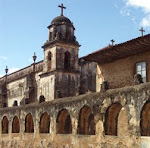
It is Sunday. The morning sun quickly warms the day. Church bells toll sonorously across this mountain pueblo at intervals, as they do every day, but today on Callejon del Sol no construction sounds punctuate their peals. The albañiles (construction workers) rest or play on Sunday after a six-day work week. On week-days they come at 7:30 am, have an early comida around 1:00 pm, and leave at 5:30 pm. They take other breaks during the day. All of them, from the most skilled to the peón who is the lowest in their hierarchy and hefts heavy loads of the traditional cement, brick and bright ceramic tiles, come dressed in neat clothes and change on site to work. They change back into street clothes—their public face—whenever they leave the work site.
Saturday concludes the work week. The albañiles are paid in cash every Saturday promptly at 2:00 pm and they leave for the day. Men vie to work at Callejon del Sol; jobs are not easy to find in Patzcuaro. Furthermore, the albañiles know that they can rely on receiving their pay in full every Saturday, which is not always the local norm. Maestro Vicente is exacting and himself works hands-on with the men to build these colonial houses. The Maestro can immediately replace anyone who slacks off from a ready and eager pool of workers with experience.
Saturday concludes the work week. The albañiles are paid in cash every Saturday promptly at 2:00 pm and they leave for the day. Men vie to work at Callejon del Sol; jobs are not easy to find in Patzcuaro. Furthermore, the albañiles know that they can rely on receiving their pay in full every Saturday, which is not always the local norm. Maestro Vicente is exacting and himself works hands-on with the men to build these colonial houses. The Maestro can immediately replace anyone who slacks off from a ready and eager pool of workers with experience.



No comments:
Post a Comment